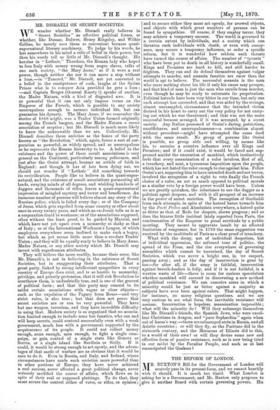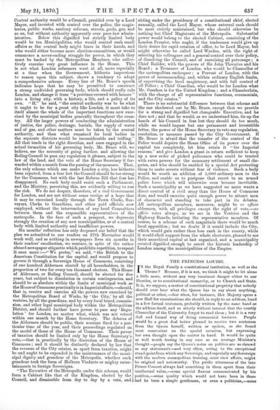THE REFORM OF LONDON.
MR. BUXTON'S Bill for the Government of London will scarcely pass in its present form, and we cannot heartily wish it should. It is much too timid. What London is asking for is a Government, and Mr. Buxton only proposes to give it another Board with certain governing powers. ilia
Central authority would be a Council, presided over by a Lord Mayor, and invested with control over the police, the magis- trates, public works, sanitary reforms, streets, gaols, gas, and so on, bat without authority apparently over poor-law admin- istration. Below this dignified but strictly limited body would be ten Municipalities, who would control such small affairs as the central body might leave in their hands, and who would either become mere election-committees, or would commence a never-ending struggle for power, in which they must be backed by the Metropolitan Members, who collec- tively exercise very great influence in the House. This is not what London reformers want at all, more especially at a time when the Government, hitherto impervious to reason upon this subject, shows a tendency to adopt a comprehensive scheme. Every line of Mr. Bruce's speech indicates hope that he may be permitted to construct a strong undivided governing body, which should really rule London, and change it from "a province covered with houses" into a living city, with a history, a life, and a policy of its own. "If," he said, "the central authority was to be what it 'ought to be for a great city like London, it must take to itself almost the whole of the important functions now exer- cised by the municipal bodies generally throughout the coun- try. All the larger powers of conducting the administration of justice, the police, drainage, burials, the supply of water and of gas, and other matters must be taken by the central authority, and then what remained for local bodies in the separate districts would be inconsiderable and trifling." All that tends in the right direction, and once engaged in the actual formation of his governing body, Mr. Bruce will, we believe, see the necessity of going further, and allowing the Ruling Council to pass any regulation it pleases, subject to the law of the land, and the veto of the Home Secretary if for- warded within a month from the passing of the measure. That, the only scheme which can make London a city, has hitherto been rejected, from a fear lest the Council should be too strong for the Commons, but with the last Reform Bill that fear has disappeared. No such body could resist such a Parliament, and the Ministry, perceiving this, are evidently willing to run the risk. We do not despair, therefore, of a real Government for London, and are not without some vestige of a hope that it may be exercised locally through the Town Clerks, Sur- veyors, Clerks to Guardians, and other paid officials now employed, without the intervention of any local Committees between them and the responsible representatives of the metropolis. In the face of such a prospect, we deprecate strongly the creation of any new municipalities, or of a central body with limited authority and insufficient powers. Six months' reflection has only deepened our belief that the plan we submitted to our readers on 27th November would work well, and as nothing in newspapers lives six months in their readers' recollection, we venture, in spite of the rather absurd newspaper etiquette which prohibits repetition, to repeat it once more :—" We prefer," we said, "the British to the American Constitution for the capital, and would propose to govern it through a Sovereign House of Commons, consisting of one hundred Aldermen electeff by all householders, in the proportion of two for every ten thousand electors. This House of Aldermen, or Ruling Council, should be elected for five years, but subject to dissolution in certain contingencies, and should be as absolute within the limits of municipal work as the House of Commons proxticallyis in Imperialaffairs,—should, that is, receive and exercise all the powers now exercised by the Metropolitan Board of Works, by the City,' by all the vestries, by all the guardians, and by every local board, commis- sion, and other legal municipal body within the Metropolitan District, and should further have power to pass any 'Regu- lation' for London, no matter what, which was not vetoed within one month by the Home Secretary. The debates of the Aldermen should be public, their sessions fixed for a par- ticular time of the year, and their proceedings regulated on the model of those of the House of Commons. Their power of taxation should be limited only by the Home Secretary's veto,—that is, practically by the discretion of the House of Commons ; and it should be distinctly declared by law that the revenue of the City estates, as apart from taxation, might be and ought to be expended in the maintenance of the muni- cipal dignity and grandeur of the Metropolis, whether such grandeur took the form of Holborn Viaducts or mighty enter- tainments to foreign Sovereigns.
"The Executive of the Metropolis, under this scheme, would form a Cabinet like that of the Kingdom, elected by the Council, and dismissible from day to day by a vote, and
sitting under the presidency of a constitutional chief, elected annually, called the Lord Mayor, whose external rank should be most strictly maintained, but who should otherwise be nothing but Chief Magistrate of the Metropolis. Substantial power would belong to the elected Cabinet, consisting of the London Premier, who ought, if the tradesmen would give up their desire for rapid rotation of office, to be Lord Mayor, but might otherwise be called Lord Warden, with the right of selecting his colleagues and a general control over their policy, of dissolving the Council, and of exercising all patronage ; a Chief Builder, with the powers of Sir John Thwaites and his Board ; a Treasurer of London, who would be Chancellor of the metropolitan exchequer ; a Provost of London, with the power of recommending, and, within ordinary English limits, of supervising the local magistracy, and with full control of all Police ; a Chief Guardian, who would be for London what Mr. Goschen is for the United Kingdom ; and a Chamberlain, with the charge of all representative functions, ceremonials, and the City estates."
There is no substantial difference between that scheme and the one shadowed out by Mr. Bruce, except that we provide for a strong and dignified but changeable Executive, and he does not ; and that he would, as we understand him, tie up the hands of his Council in fear lest they should do too much, while we would impose but one permanent and irresistible fetter, the power of the Home Secretary to veto any regulation, resolution, or measure passed by the City Government. If Mr. Bruce is afraid that the transfer of the control of the Police would deprive the Home Office of its power over the capital too completely, let him retain it "for Imperial reasons," and give London a grant in return sufficient to keep up a new order of picked policemen who could be trusted with extra powers for the summary settlement of small dis- putes, and who should be enabled by a special Act protecting them to make arrests without fear of violence. Such a body would be worth an addition of 5,000 ordinary men to the Police, and enable us to postpone that resort to an armed police force which will otherwise soon become inevitable. Such a municipality as we have suggested no more wants a direct control of a civil army than the House of Commons does, and would exercise quite enough power to attract men of character and standing to take part in its debates. All metropolitan members, moreover, might be ex officio aldermen, with all privileges except the right of vote,—ex officio votes always, as we see in the Vestries and the Highway Boards, irritating the representative members. Of course, to a scheme of such magnitude there would be much local opposition ; but we doubt if it would include the City, which would gain rather than lose rank in the county, while it would elicit support from the whole electorate, pleased to see their anarchical capital at last organized, and a municipality created dignified enough to assert the historic leadership of London among the municipalities of the Empire.































 Previous page
Previous page